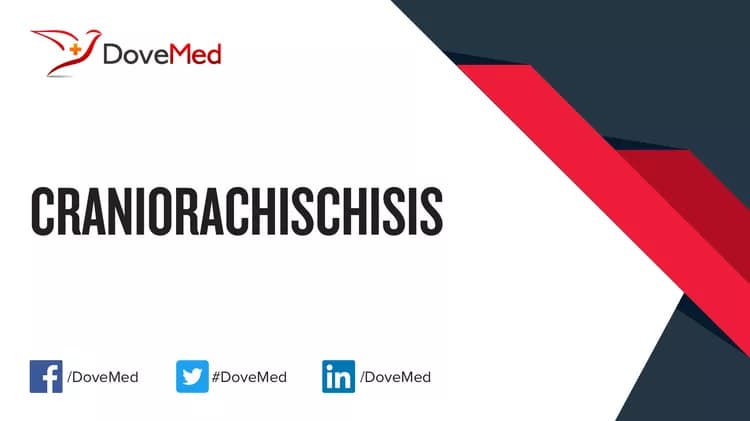What are the other Names for this Condition? (Also known as/Synonyms)
- CRN (Craniorachischisis)
What is Craniorachischisis? (Definition/Background Information)
- Craniorachischisis is the most severe type of neural tube defect in which both the brain and spinal cord remain open; both anencephaly and spina bifida (from the cervical region to the lumbar or sacral region of the spine) are present
- Fetuses with Craniorachischisis often miscarry during pregnancy or die shortly after birth
- The cause is thought to be multifactorial, which means that a combination of genetic and non-genetic factors play a role
(Source: Craniorachischisis; Genetic and Rare Diseases Information Center (GARD) of National Center for Advancing Translational Sciences (NCATS), USA.)
Who gets Craniorachischisis? (Age and Sex Distribution)
- Craniorachischisis is a rare congenital disorder. The presentation of symptoms may occur at birth
- Both males and females may be affected
- Worldwide, individuals of all racial and ethnic groups may be affected
What are the Risk Factors for Craniorachischisis? (Predisposing Factors)
- A positive family history (such as previous miscarriages) may be an important risk factor for Craniorachischisis
- Currently, no other risk factors have been clearly identified for the disorder
It is important to note that having a risk factor does not mean that one will get the condition. A risk factor increases one’s chances of getting a condition compared to an individual without the risk factors. Some risk factors are more important than others.
Also, not having a risk factor does not mean that an individual will not get the condition. It is always important to discuss the effect of risk factors with your healthcare provider.
What are the Causes of Craniorachischisis? (Etiology)
The cause of Craniorachischisis is thought to be multifactorial, which means that a combination of genetic and non-genetic factors play a role.
- Despite neural tube defects (NTDs) being among the most common birth defects, their underlying cause is not completely understood. In most cases they are thought to be multifactorial, which means that one or more genes interact with the environment to predispose an individual to having a NTD
- Because folic acid can sometimes prevent NTDs, many studies have focused on genes known to be involved in folate metabolism. In some populations, the MTHFR gene has been associated with NTDs
- More recent studies have suggested that mutations in the CELSR1 and SCRIB genes may be associated with Craniorachischisis specifically
(Source: Craniorachischisis; Genetic and Rare Diseases Information Center (GARD) of National Center for Advancing Translational Sciences (NCATS), USA.)
What are the Signs and Symptoms of Craniorachischisis?
The signs and symptoms of Craniorachischisis may include:
- Anencephaly
- Cervical spina bifida
- Myelomeningocele
- Anal atresia
- Bifid sternum
- Congenital diaphragmatic hernia
- Omphalocele
- Sirenomelia
(Source: Craniorachischisis; Genetic and Rare Diseases Information Center (GARD) of National Center for Advancing Translational Sciences (NCATS), USA.)
How is Craniorachischisis Diagnosed?
Craniorachischisis is diagnosed on the basis of the following information:
- Complete physical examination
- Thorough medical history evaluation
- Assessment of signs and symptoms
- Laboratory tests
- Imaging studies
- Prenatal ultrasonography to detect fetal abnormalities
- Biopsy studies, if necessary
Many clinical conditions may have similar signs and symptoms. Your healthcare provider may perform additional tests to rule out other clinical conditions to arrive at a definitive diagnosis.
What are the possible Complications of Craniorachischisis?
Craniorachischisis is a severe condition affecting the central nervous system of the developing fetus or newborn child. It usually results in:
- Miscarriage of a fetus with the condition
- Inability to survive after birth
How is Craniorachischisis Treated?
There is no cure for Craniorachischisis, since it is believed to be a genetic condition. The treatment is usually given to manage the signs and symptoms and any complication that develops.
How can Craniorachischisis be Prevented?
- Craniorachischisis may not be preventable, since it is a multifactorial (genetic) disorder involving multiple genes
- If there is a family history of the condition, such as miscarriage in a previous pregnancy, then genetic counseling will help assess risks, before planning for a child
- Active research is currently being performed to explore the possibilities for treatment and prevention of inherited and acquired genetic disorders
What is the Prognosis of Craniorachischisis? (Outcomes/Resolutions)
The prognosis of Craniorachischisis is extremely poor, since the condition almost always results in fatalities.
- Fetuses with Craniorachischisis may miscarry during gestation
- If live birth occurs, the newborn succumbs to the condition
Additional and Relevant Useful Information for Craniorachischisis:
The following DoveMed website link is a useful resource for additional information:
Related Articles
Test Your Knowledge
Asked by users
Related Centers
Related Specialties
Related Physicians
Related Procedures
Related Resources
Join DoveHubs
and connect with fellow professionals


0 Comments
Please log in to post a comment.